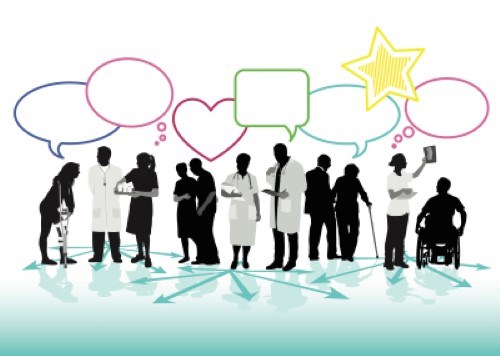Communication is a pillar of medicine. While we remember (or don’t) the hundreds of hours in the library with our noses stuck in immunology and anatomy books, arguably the most important skill we learn in medical school is how to interact with patients. A physician may have a photographic memory and the best examination scores, but without the ability to communicate effectively, this physician will struggle.
In the spring of 2020, when the COVID pandemic came to the United States, it forever changed medicine and life as we know it. The toll it has taken on human life, mental health, and everyday activity has been unimaginable. Yet the impact it has had on our ability as physicians to effectively communicate1 with patients has been less well documented.
I realized the scope of this issue a few months ago when my wife and I went to the hospital for the delivery of our first child. My wife was born with profound hearing loss, but she has adapted with the use of hearing aids and lip-reading to allow her to communicate and become a successful physician. An unintended consequence of the COVID pandemic and the widespread use of masks has been a hindrance to her ability to communicate effectively. While creating an effective barrier to pathogen spread, tightfitting N95 masks also tend to muffle speech. Furthermore, opaque masks have effectively eliminated her ability to lip-read. The combination of muffled speech and an inability to lip-read has made it very difficult for her to understand patients and providers alike.
Fortunately, clear masks have been designed and approved2 for hospital use. These clear masks allow my wife to lip-read and significantly improve her ability to understand speech. In anticipation of our delivery, we emailed both the OB/GYN and pediatric departments well ahead of time to ensure that they would have clear masks available to facilitate communication with my wife during and after the delivery.
Upon our arrival at the hospital, we were greeted by the labor and delivery nurse and an iPad on a stand. My wife and I looked at each other and quickly corrected the nurse that we did not need an American Sign Language interpreter.
Common misconception: Not all Deaf people sign. Just as you might ask a patient what their preferred language is, consider asking Deaf people for their preferred method of communication.
Just after the nurse returned the iPad, the anesthesiology resident brought the same iPad right back into the room. After we went through the explanation one more time, the nurse and anesthesiology resident apologized for their misunderstanding and were eventually able to find clear masks.
Despite our emails and frequent in-person reminders, nurses and physicians wore clear masks <50% of the time that they interacted with my wife. Fortunately, I was in the room and able to repeat things to her with my mask pulled down.
But what if I hadn’t been in the room? Even as a well-educated physician, isn’t it important for my wife to hear the nurses and physicians correctly? What good are the best discharge instructions if your patient cannot understand what you are saying? Even worse, what if a nurse had administered a medication my wife was allergic to because my wife couldn’t understand the nurse?
At our 48-hour pediatrician appointment (in a different healthcare system), did our pediatrician wear a clear mask? Despite our multiple emails to the office weeks in advance and their repeated assurances that clear masks would be available, they were not. What if I hadn’t been there to repeat questions and statements to my wife? What if I wasn’t a health-literate physician and had accidentally misinterpreted things to my wife? Shouldn’t a first-time mother have the right to communicate effectively with her pediatrician?
Overall, I don’t believe the blame falls solely on the nurses, the anesthesiology resident, or our pediatrician. Some blame assuredly resides with the healthcare system for failing to provide and ensure compliance with the use of clear masks. Moreover, one can also blame it on the pandemic.
Failure to communicate effectively is not isolated to the Deaf or even to the COVID pandemic. Multiple studies have demonstrated that non-English speaking patients may have worse outcomes than their English-speaking counterparts.3,4 Is this in part due to occasionally foregoing the use of a translator service? Probably. I’m guilty of not always using a certified translator 100% of the time.
Will my recent frustrations with communication during our delivery lead me to be more conscientious of patients with different communication needs? I hope so. With any problem, the first step is recognition. Hopefully, the next time you or I see a patient, we will take a second to confirm the patient can adequately understand us. That may mean speaking slower, speaking louder, or making sure the patient has hearing aids in place beforehand. It may also mean taking the time to sit down to be at eye level, using a clear mask, using a certified translator, or allowing a family member to be at the bedside.
The COVID pandemic has been an obstacle to many things, but let’s make sure it doesn’t take away from our greatest skill: the ability to communicate effectively.
References
- Berland, N. Communication in the Time of COVID-19 (Video recording of a talk by Claritza L. Rios, MD, medical director at Curai Health.) Blog, Kings County/SUNY Downstate Emergency Medicine Residency. Published April 17, 2020.
- Letter from the U.S. Food & Drug Administration to Aaron Hsu, CEO of ClearMask LLC. April 6, 2020.
- Schwartz HEM, Matthay ZA, Menza R, et al. Inequity in discharge pain management for trauma patients with limited English proficiency. J Trauma Acute Care Surg. 2021;91(5):898-902.
- Portillo EN, Stack AM, Monuteaux MC, Curt A, Perron C, Lee LK. Association of limited English proficiency and increased pediatric emergency department revisits. Acad Emerg Med. 2021;28(9):1001-1011.



